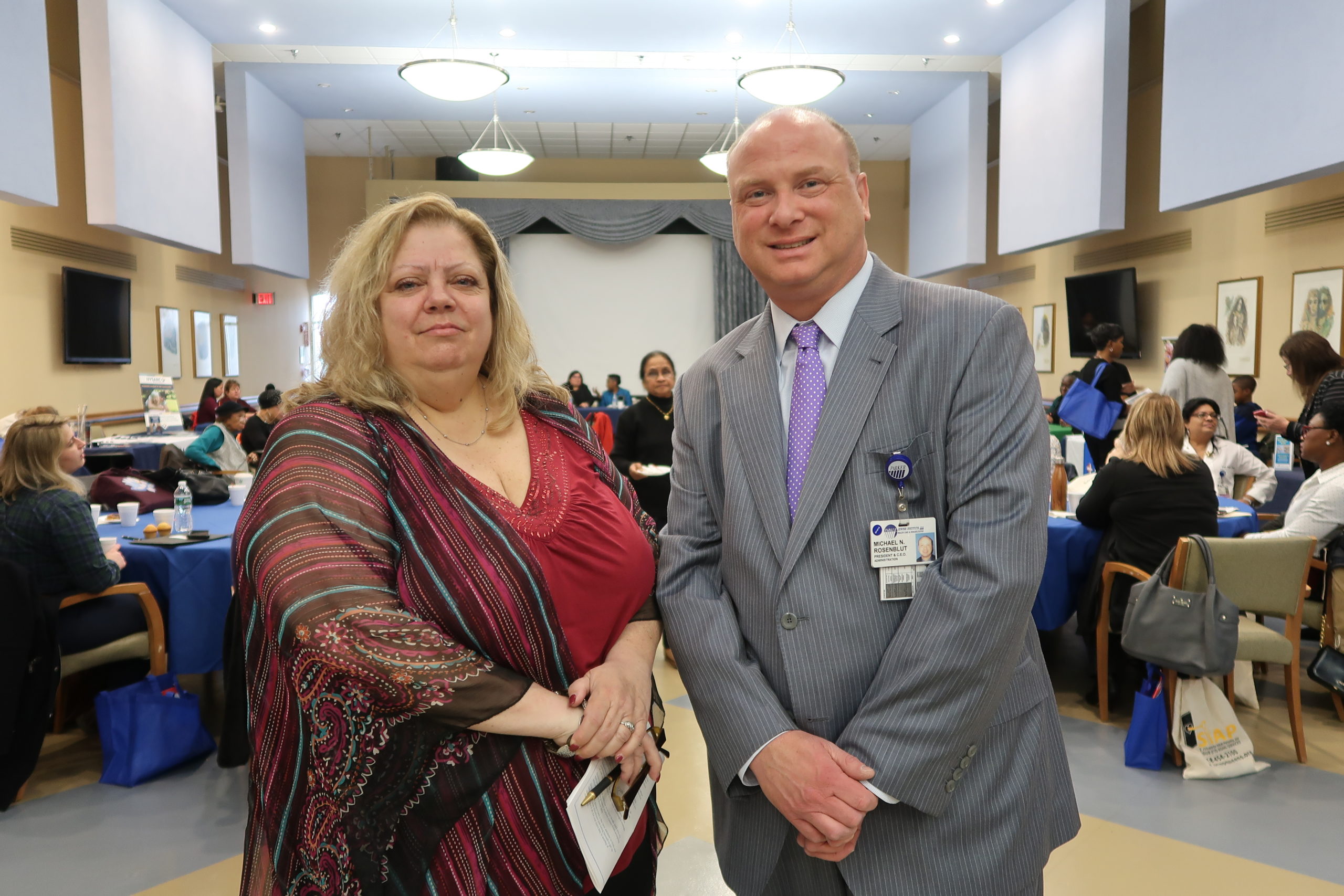Parker Jewish Institute hosted the first Services Now for Adult Persons (SNAP) Caregiver Conference Nov. 15.
Over 80 health care professionals attended the conference. The conference brought together a panel of experts who addressed the complex issues of caregiving. Paola Miceli, MPA, SNAP’s President and CEO, said her goal was to provide valuable information to caregivers and the professionals who assist them. Michael N. Rosenblut, Parker President and CEO, welcomed the group of professionals.
“Parker is here for everyone, between our skilled nursing facility, all our community programs, insurance with Age Well New York, and transportation, we’re here for you,” Rosenblut said.
Marie Ellen Galasso, LMSW, SNAP’s Director of Social Services, served as the conference master of ceremonies. She asked Bernadette Josephs, LMSW, Director of SNAP’s Caregiver Support Program, for an overview. “The main purpose of SNAP’s program is the well-being of caregivers. Many people are not prepared for their new role as caregivers. There’s a lack of support from family and friends. So, our goal is to provide support for caregivers, including counseling, support groups and respite,” Josephs said.
The keynote speaker was Diane Cooper, RN, President, Caregivers Outreach Ministry Empowerment (COME). “The goal of COME is to make sure caregivers have all the support and information about available resources,” Cooper said. “We finally got the Family Care Act, and other bills, because the caregiver support groups advocated and told legislators what we needed.”
Cooper said hers is the only organization hosting a “Family Caregivers Award” each November (National Family Caregivers Month) for the last 12 years, which has recognized over 160 caregivers. “The key to effective caregiving is communication. You’ve got to tell your doctor or family if you need help. You must also know your limitations; it’s important to take time off for ourselves as caregivers,” she said.
Galasso introduced Caolina Hoyos, LMSW, Director, Caregiver Resource Center, NYC Department for the Aging (DFTA). Hoyos discussed two types of caregivers, the informal family caregiver, and the formal, paid caregiver. Looking at statistics for all 50 states, there were on average 34.5 million informal caregivers caring for people 50 years and older, she noted. Nationally, 60 percent of informal caregivers are female and 40 percent are male. “85 percent are caring for a relative,” Hoyos added.
She noted a survey of unpaid caregivers in NYC had three top findings: all wanted much more respite time; all wanted more information on resources; all needed transportation help. As a result, City Hall allocated $4 million to DFTA for more respite. She said 2015 saw increases in funding for senior services from NYC and NYS, because of advocacy conducted by professional caregivers. And in 2015, Governor Cuomo allocated $67.4 million for caregivers working with Alzheimer’s and Dementia. As of January 1, 2018, NYS gives caregivers paid leave up to 50% of the average NYS weekly salary. There’s also a personal assistance program for caregivers through Medicaid. She advised the audience to call 311 and ask for the Caregiver Resource Center.
Robert Sabella, Parker’s Marketing Outreach Associate, said Parker established the Alzheimer’s Caregiver’s Support Initiative through a New York State Department of Health grant. Parker’s Respite Program gives relief to caregivers of those with Alzheimer’s and other dementias, while getting their loved ones involved in meaningful activities to enhance quality of life, increase socialization and stay active. To apply for the program, please call (516) 586-1567.
Aside from respite and financial assistance, Galasso said caregivers need emotional support. To address that issue, she called on Michael Upston, LCSW, who directs the Community Advisory Program for the Elderly (CAPE), based at Samuel Field YM & YWHA. CAPE is a community mental health clinic in Queens serving older adults and their families. His program also gives clinical training to SNAP Social Work staff. Upston talked about caregiving through the lens of mental health. “I was working with a colleague with a homebound client who scored high in significant depression. My colleague connected his client to the Virtual Senior Center, and with this one intervention, his depression level was lowered from 20 percent to 3 or 4 percent,” Upston said.
The next speaker, elder law attorney Ronald Schwartz, talked about key legal documents that older adults need. “Caregivers should know there are several documents older adults need as they age. A Will is about what happens to your assets, it does not affect the quality of your life, but it could affect your heirs! Under NYS law, a Will allows you to create a Special Needs Trust, but you must leave at least 1/3 to your spouse.” Durable power of attorney, health care proxy, living wills, advance directives, and health care guardian, are other key documents. “As you age, the bottom line is keep control of your assets,” he said.
Retired school psychologist Lucy Roman-Paynter, a caregiver for her elderly mother, spoke last. When she clicked on the Alzheimer’s Association website, she found a link to SNAP. She joined SNAP’s support group, and they asked her to talk about her experiences. “I received enhanced resilience by joining the SNAP caregivers support group. My mother is in the later stages of CPOD and Dementia at 98 years old, but she still smiles, she still laughs, etc. “I had all the symptoms. It’s important that you recognize these symptoms and make sure you eat well, sleep well, and seek out emotional support, because the life you save might be your own,” she added.
SNAP staff member Mindy Lesser secured the nine exhibitors with resource tables: Brandywine Senior Living; Centerpointe Funding Corp; NYSARC Trust Services; Ann-Margaret Carrozza, Esq; Flushing House; AgeWell New York; Lifefone; Reddy Care Physical Therapy; Boulevard Assisted Living. NYS Assemblyman David Weprin and former NYS Assemblywoman Ann-Margaret Carrozza, Esq., both attended.
For more information on SNAP Caregiver Programs, please call (718) 527-5380.



